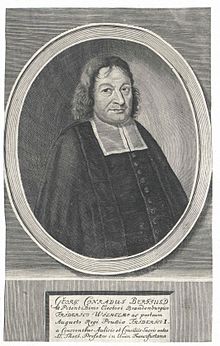Georg Conrad Bergius
Georg Conrad Bergius , also Georg Konrad Berg , (* December 21, 1623 in Berlin ; † September 7, 1691 ibid) was a German Reformed theologian and court preacher in Brandenburg-Prussia . He was an advisor to the elector and taught his sons Karl Emil von Brandenburg and Friedrich, who later became King Friedrich I of Prussia .
Life
Bergius was the first son of the Berlin court preacher Johann Bergius and his wife Dorothea, whose father Martin Füssel (1571–1626) had also been court preacher in Berlin. After attending the Reformed Gymnasium in Bremen (under the rectorate of his uncle Conrad Bergius [1592–1642]) Bergius studied Protestant theology from 1641–1648 at the Albertus University of Königsberg , the Brandenburg University of Frankfurt and the University of Leiden . After a study trip to France, he acquired the academic degree of Magister in Philosophy at the Brandenburg University of Frankfurt in 1650 and received his doctorate in theology there in 1651.
In 1653 he was appointed professor of theology (an office that his father had already held from 1615 to 1620) and preacher of the Reformed community. In 1664 he was appointed court preacher to the double residence of Berlin-Cölln by Elector Friedrich Wilhelm von Brandenburg . As successor to Bartholomäus Stosch , he was also consistorial councilor in 1686 . His first marriage to Elisabeth Schönhaus (1629–1679) arose a. a. the son Johannes Bergius (1657–1730), Prussian councilor, and the daughter Eleonore (1655–1688), who married Friedrich Wilhelm Stosch , the son of his Berlin colleague and predecessor.
meaning
During his time in Berlin he was one of the elector's most important ecclesiastical policy advisors, whose sons Karl Emil and Friedrich (later King Friedrich I of Prussia ) he taught. As a typical representative of the Reformed Irenik , he advocated a compromise with the Lutherans and took part, for example, in the initiatives of John Dury , although on the question of predestination, instead of the universalism prevailing in Prussia, he represented the orthodox position of the Dordrecht Synod . On the other hand, in 1682 he prevented the Brandenburg court from supporting the initiative of Bishop Christoph de Royas y Spinola , which aimed at a reunion of the Protestants with the Roman Catholic Church. In 1691, through a declaration of no objection, he made it possible for Philipp Jacob Spener to be appointed provost and consistorial councilor at the St. Nikolai Church in Berlin .
literature
- Rudolf von Thadden : The Brandenburg-Prussian court preachers in the 17th and 18th centuries. A contribution to the history of the absolutist state society in Brandenburg-Prussia. de Gruyter, Berlin 1959, pp. 185f.
- Lothar Noack, Jürgen Splett: Bio Bibliographies. Brandenburg scholars of the early modern period. Berlin-Cölln 1640–1688. de Gruyter, Berlin 1997, pp. 10-13. ISBN 3-05-002840-8 .
- Peter Bahl : The court of the great elector. Cologne Weimar 2001, ISBN 3-412-08300-3 .
Web links
- Writings by Georg Conrad Bergius in VD 17
- Bergius' digitized prints in the Post-Reformation Digital Library (PRDL)
| personal data | |
|---|---|
| SURNAME | Bergius, Georg Conrad |
| ALTERNATIVE NAMES | Berg, Georg Konrad |
| BRIEF DESCRIPTION | German Reformed theologian and court preacher in Brandenburg-Prussia |
| DATE OF BIRTH | December 21, 1623 |
| PLACE OF BIRTH | Berlin |
| DATE OF DEATH | September 7, 1691 |
| Place of death | Berlin |
